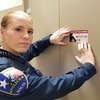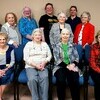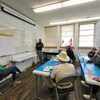Social distancing orders extended
By Cristin Parker
cristinparker@thecherokeean.com
As of 4 p.m., Tuesday, March 31, whilst Cherokee County does have three confirmed cases of Coronavirus (COVID-19) infections – one in Wells; the other pair’s locations unknown – county officials have yet to call for a shelter-in-place mandate or any other type of lock-down order.
Some areas – including Smith, Angelina and Gregg counties -- are using shelter-at-home (sometimes called shelter-in-place) orders to help slow the spread of the coronavirus (COVID-19).
Cherokee County officials had not issued any such mandate as of 4 p.m., Tuesday, March 31.
“Sheltering at home” means that citizens remain at home and only go out to purchase essential supplies, visit medical professionals or leave during an emergency.
President Donald Trump on Sunday, March 29, and Texas Governor Greg Abbott on Tuesday, March 31, both opted to extend national and state social distancing orders – including recommendations for people to stay at home and not to gather in groups of more than 10 -- through Thursday, April 30.
“Social distancing is our best tool in the fight against COVID-19, and the actions we have taken thus far have proven to be effective in limiting the spread of this virus,” Gov. Abbott said during a press. “Now it is time to redouble our efforts to reduce further exposure as much as possible and flatten the curve. As with all the actions the state is taking, the Essential Services and Activities Protocols is informed by the expertise and guidance of the CDC as well as state and local health officials. I urge my fellow Texans to heed these heightened social distancing directives to protect their health and the health of those around them. By following these guidelines, we will limit the spread of COVID-19 and overcome this challenge together.”
Abbott also ordered Texas schools to remain closed and continue distance learning until Monday, May 4.
The city of Jacksonville also made the decision to continue to restrict access of city facilities to the public through April 30. The Jacksonville Police Department lobby and municipal parks remain open. Residents are strongly encouraged to practice social distancing guidelines. At this time, Lake Jacksonville is remaining open to normal activities.
City facilities of Alto, Bullard, Cuney, Rusk, Wells, Reklaw, Gallatin and New Summerfield also all remain closed to the public until further notice.
Cherokee County Judge Chris Davis and officials with the Cherokee County Public Health Department reported confirmation of the county’s first case of the virus on Thursday, March 26. On Friday, March 27, Wells Mayor Pro Tem and Fire Chief Robert Kalka confirmed that case struck an individual in Wells.
“The mayor (C.W. Williams) and I thought it would be best to be proactive about this,” Kalka said of releasing the location of Cherokee County’s first case and explained the mayor of a city has that authority. “There seems to be a disconnect — like, since we’re smaller communities, it’s not going to happen here. Well, it’s here in Wells. That’s why it’s so important to stay vigilant and follow the guidelines our medical officials have set out.”
The county’s other two cases, as reported by the office of County Judge Chris Davis and the Cherokee County Public Health Department (CCPHD), came in on March, Saturday, March 28 and Monday, March 30.
Releases issued by the CCPHD report, “the second case is travel related and the person is currently recovering with mild illness under self-isolation at home. (The individual with the third local case of COVID-19) had traveled within the United States and county health officials are working on contacting anyone who has had close contact with the individual.
“Health care providers and public health officials will remain in contact with these confirmed individuals, as well as with anyone that interacted with this individual, if they believe they may be at risk of infection.”
City officials with Jacksonville, Rusk, Reklaw and Alto reported they had not received any conformation on positive cases in their cities, as of Tuesday afternoon.
Human coronaviruses are most commonly spread through respiratory droplets, such as coughs and sneezes. Symptoms of COVID-19 include fever, cough and shortness of breath. People who are at higher risk for serious complications are those with underlying health conditions and those who are over the age of 65.
“We must continue to do everything we can to strengthen our personal health protection and social distancing practices, as well as following the instructions of federal, state, and local officials,” County Judge Chris Davis said in the releases issued by his office and the CCPHD.
County and health department officials remind everyone to take these simple steps:
• Wash your hands often with soap and water for at least 20 seconds, especially after going to the bathroom; before eating; and after blowing your nose, coughing, or sneezing. If soap and water are not available, use an alcohol-based hand sanitizer with at least 60 percent alcohol.
• Avoid touching your eyes, nose, and mouth with unwashed hands.
• Avoid close contact with people who are sick.
• Stay home when you are sick.
• Cover your cough or sneeze with a tissue, then throw the tissue in the trash.
• Clean and disinfect frequently touched objects using a regular household cleaning spray or wipe.
• Be sure to call before going to your doctor or emergency department to prevent any potential spread.
The Texas Department of State Health Services reports, as of noon Tuesday, March 31, there have been 3,266 cases of COVID-19 reported in 122 Texas counties – with 41 of those cases proving fatal. A total 42,992 tests have been administered – 3,934 in public labs; 39,058 in private labs.
Cherokee County Emergency Management Coordinator Sergio Servin shared these tips from the American Red Cross to help residents cope with stress and support others during this emergency.
Normal feelings people may be experiencing right now could include:
• fear about running out of essential supplies;
• anxiety, particularly about being separated from loved ones;
• uncertainty about how long you will need to shelter at home;
• concerns for your physical safety and that of others;
• fear of getting sick;
• guilt about not being able to fulfill responsibilities, such as work, parenting or caring for dependents;
• boredom or isolation;
• thoughts of blame, worry or fear;
• worry about loss of income; and
• fear of being stigmatized or labeled by this illness, if you become sick.
Coping tips recommended are:
• Stay connected with loved ones through video calls, phone calls, texts or social media.
• Remain informed with accurate, reliable information. Avoid social media accounts and news outlets that promote fear or rumors.
• Monitor your physical health needs and those of your loved ones. Eat healthy food, and drink plenty of water.
• Unless you are showing signs of illness or have tested positive for COVID-19, going outside to exercise and walk pets is okay. But don’t forget to practice social distancing by keeping at least six feet away from others.
• Hold an image in your mind of the best possible outcome. Make a list of your personal strengths and use these to help both yourself and others stay emotionally strong.
If you are religious or spiritual, follow practices at home that provide you with comfort and emotional strength.
Help others by:
• reaching out to older adults or people with chronic health conditions and offer to help. For example, offer to pick up groceries, medications and other essential supplies. Check in with them regularly but practice social distancing by keeping at least six feet away when you deliver essential items;
• talking to your children and explain why this is happening and how long it might last. Use language that is normal and consistent with how you usually communicate. Be creative and think of fun activities that will occupy their time. Keep a schedule, set appropriate limits and maintain usual rules when possible;
• taking care of your pets, which can be an essential part of your support system. Like people, pets react to changes in their environment and routine, so their behaviors may change, as well. Keep track of their well-being and take care of their needs as best you can; and
• showing kindness to people who may not have a support system or are isolated. There may be limits to what you can do in reaching out, but a little kindness may be just what someone needs.
Please support The Cherokeean Herald by subscribing today!
